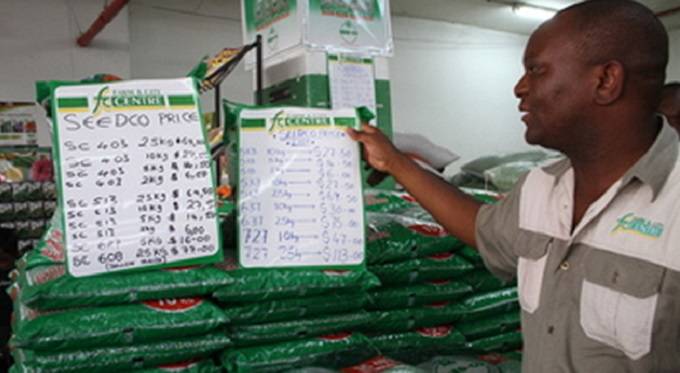
Oliver Kazunga/Prosper Ndlovu, Business Reporters
DESPITE prospects for a good 2020/2021 rain season, farmers say high input costs are likely to frustrate the possibility of a bumper harvest.
As preparations for the summer cropping season gather momentum, most farmers are pinning their hopes on the Government-sponsored input schemes, as they cannot afford prices pegged by various seed houses and input dealers.
While the Government has come up with a number of interventions such as the Command Agriculture programme as well as the Pfumvudza/Intwasa initiatives, which are already distributing inputs like seed and fertiliser to communal farmers or small holder farmers dotted across the country, these alone are not enough.
Farmers say the prices of major inputs such as fertilisers and seed (soya and maize) have gone beyond the reach of many this year, which will likely cripple their planting capacity. A snap survey carried out by Chronicle has revealed that a 10kg bag of seed maize was pegged at average $2 783 with 25kg going for above $9 000, 50kg Compound D fertiliser at $2 050 while ammonium nitrate costs about $2 600.
Given the subdued disposable incomes, the challenge of input affordability has raised concerns that some farmers countrywide might reduce the hectarage they initially planned to plant.
According to agriculture experts, a farmer needs about 20-25kgs of maize seed per hectare and about 300kgs of Compound D fertilizer for the same area depending on the soil type and 150kgs of Ammonium Nitrate for top dressing.
Zimbabwe Commercial Farmers’ Union vice president, Mr Winston Babbage, said the cost of inputs has become a perennial challenge for farmers.
“Our price of inputs like seed is the highest in Africa so far and it’s totally unfair that year-in year-out, the price of inputs is exorbitantly priced,” he said.
“This is dampening the agricultural season for those farmers who don’t get the inputs under the Government’s supported programmes.
“We’re currently engaging the seed houses to lower the cost of inputs.”
Zimbabwe Integrated Commercial Farmers’ Union (ZICFU) president, Ms Maiwepi Jiti, said some farmers will not be able to break-even given the obtaining price of inputs.
“We are so much worried about the prices of inputs at the moment. For example, what happens is that in the last farming season especially tobacco farmers, were paid half of their earnings in foreign currency and the other half in RTGS of which the RTGS was pegged at US$1: $25 at the time,” she said.
“But now the exchange rate has gone up to above $80. So, now all the prices for inputs have gone up, which means the farmer is not going to manage buying the inputs as they have been highly priced than the previous exchange rate of US$1: $25 which was used to pay them for their deliveries.”
The Reserve Bank of Zimbabwe (RBZ) introduced the weekly Foreign Currency Auction Trading System towards the end of June replacing the US$1: $25 exchange rate with a view to promote price stability. At this week’s auction, the exchange rate eased at $81,35. While farmers for other commodities such as maize were being paid in local currency for their deliveries and given the prevailing prices of inputs, it is difficult for them to go back and buy critical inputs for the upcoming summer cropping season, some of which are priced in forex.
“How are the farmers going to buy the inputs that are being charged in US dollars or equivalent, which is at a very high rate than they are getting.
“For example, look at the producer price of wheat, currently is at $43 000 per tonne but the inputs are costing much higher than what is being paid to the farmer and it’s in local currency,” said Mrs Jiti.
“We are now in a dilemma to the extent that some have reduced their initial hectarage they intended to plant.”
The ZICFU boss said apart from the seed price dilemma some farmers have already started planting particularly irrigated tobacco.
